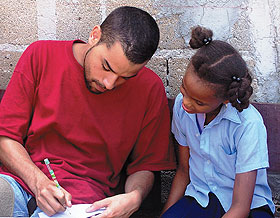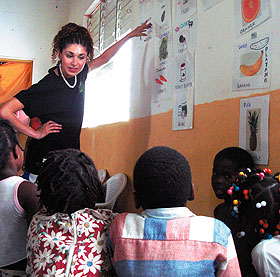  |
| HOME | THIS ISSUE | CALENDAR | GRANTS | BACK ISSUES | < BACK | NEXT > |
Study Abroad in Dominican Republic an eye-opener for studentsby Elizabeth Omara-Otunnu - October 29, 2007 | ||||||
| Fifteen UConn students got the opportunity to put their idealism into practice, and to grapple with understanding the root causes of poverty, during a Study Abroad program this past spring in the Dominican Republic. The students spent three weeks there in May under the guidance of Kathryn Strother Ratcliff, an assistant professor of sociology. Ratcliff says that for students, exposure to a foreign setting where they interact with people living in extreme poverty is a powerful experience. “Intense immersion changes students,” she says. “Seeing the actual living conditions of people in extreme poverty leads to a whole new level of understanding.”
Many of the students were taken aback by the level of poverty in some areas. “I’ve worked in underprivileged areas in the U.S.,” says Melissa Czajkowski, a sophomore majoring in nursing with a minor in human rights. “I’ve seen destruction after Hurricane Katrina. But it didn’t compare to the daily life of Haitians in the Dominican Republic.” Haiti, the poorest country in the Western Hemisphere, shares the Caribbean island of Hispaniola with the Dominican Republic. Haitians in the Dominican Republic are an impoverished and politically marginal minority. Adds Charlayne McStay, a junior majoring in chemistry with a minor in human rights, “I’ve always considered myself fairly worldly, but seeing people without sufficient food and water and health care put things into perspective for me.” McStay hopes to become a doctor. “Being on a college campus, we hear and read about poverty,” says sophomore Chelsea Krombel. “I think it’s important to step out of our comfortable lives. This was an opportunity to do that.” The three-credit sociology course, one of a growing cluster of classes at UConn that integrate service with academics, was organized jointly by the sociology department and the Office of Community Outreach and sponsored by Study Abroad. “We want Study Abroad at UConn to help students become global citizens, and this program exemplifies our efforts,” says Ross Lewin, director of Study Abroad. Ratcliff says the Dominican Republic is an ideal place for sociological study. In an economy largely dependent on tourism and sugar cane, the same company that developed a 7,000-acre resort also owns the cane fields, where workers struggle for a meager living. “It’s sociology in your face,” says Ratcliff. “If you don’t understand power relations and exploitation after this ….” From a base at the Haitian Mission Baptist Church in the town of La Romana, the students worked with Haitian immigrants. They visited the bateys – villages where sugar cane cutters live – to provide health education, and taught English in local schools. In preparation for the trip, the students studied the social history of the Dominican Republic, the epidemiology of HIV/AIDS, and some Spanish and Creole.
While there, they kept journals and participated in daily sessions reflecting on how their activities related to their reading. On their return, they had to write a sociological paper. Ratcliff says the students were full of idealism and the desire to help. Yet she encouraged them to look beyond the helping model to understand the need for more fundamental change. “I hope they came away feeling they learned something, but not that they solved the problems,” she says. “I tried to help them see the problems as structural problems, and give them a better understanding of the complexity of social, economic, political, and human rights issues.” She also pointed out to the students that solutions developed in one setting may not work in a different social context. Condom use as a strategy to prevent the spread of HIV/AIDS, for example, is of limited application where the cost of a single condom is 50 percent of a family’s daily disposable income. “We talked about some of the historical, social-structural, and corporate reasons for poverty as it now exists, and the importance of international pressure in seeking structural change and promoting respect for human rights,” Ratcliff adds. Some students say the experience changed their outlook on life. “One country changed my whole view of the world and me,” says Czajkowski, the nursing major. She now hopes to specialize in international public health. Dmitry Poletayev, a senior majoring in anthropology, says “This was probably the best three weeks of my life. The experience made us all grow.” Poletayev wrote a paper titled “Haitian Workers in the Dominican Republic: Facing International Apathy and Human Exploitation.” He hopes to go to graduate school and become involved in international development and humanitarian aid. For others, the experience changed or cemented their plans for the future. “I was playing with ideas for a major,” says Krombel, who wrote a paper about the sugar industry titled “Sweet Deal.” “Now I know it will be human rights or political science-related.” Asked whether they would recommend the program to others, the participants are enthusiastic. “Every student should have the opportunity to go,” says Czajkowski. Arnaldo Perez Jr., a senior majoring in human development and family studies, wrote a paper about the education system and how it perpetuates various types of discrimination. He hopes to pursue a career working with inner city teens, and says he would definitely recommend the program. “You can learn a lot about yourself,” he says. “Your strengths and weaknesses, getting along day-to-day in close quarters, learning how to collaborate with a group, and how to get information across to people.” Reporting by Sherry Fisher is included in this article. |
| ADVANCE HOME UCONN HOME |


